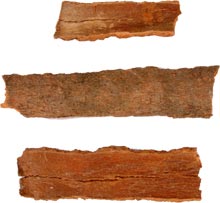|
|
|
Ingredients of Nirdosh
|
|
|
BASIL |
|
 |
|
Basil
(Ocimum basilicum), of course, is popularly
known as a splendid spice. When used as a tea, it
is also an excellent remedy to stop vomiting.
The word 'basil' is derived
from the Greek word "basileus" that means
'king'. From the sacred Basil of India,
to the sweet pungent Basil of Thailand, to the aromatic
Basil of Egypt, this herb is abundant throughout
the world and is common in many cuisines.
Most commonly associated with the Mediterranean
cuisines of Italy, Greece and France, this herb
(also known as Sweet Basil) is welcome
in any kitchen.
Holy Basil (Ocimum sanctum),
like sweet (culinary) basil, comes from India where
it is revered as a sacred herb. The Egyptians burned
a mixture of Basil and Myrrh to appease their gods.
Sweet Basil was introduced in Europe as a seasoning
for food. The herb has very important medicinal
properties - notably its ability to reduce blood
sugar levels. It also prevents peptic ulcers and
other stress related conditions like hypertension,
colitis and asthma. Basil is also used to treat
cold and reduce fever, congestion and joint pain.
Due to its antibacterial and fungicide action, Basil
leaves are used on itching skin, insect biting and
skin affections |
|
CLOVE |
 |
|
Cloves (Caryophyllum aromaticus)
are actually the dried buds of the clove tree. Used
in China for more than two thousand years, legend
has it that Cloves are an aphrodisiac. Although
there isn't any evidence to back up this claim,
we do know that oil of Clove is a time-honored remedy
for toothache. Clove oil is highly antiseptic. It
is also used to stop vomiting.
- Ease toothache pain
- Relieve indigestion
- Control diarrhea
- Heals cuts and bites
|
|
LIQUORICE |
 |
|
Liquorice root is
an excellent aid for exhaustion and long term stress
as it is an adrenal aid, it nourishes the adrenal
glands and can help recovery from ME.
It is also a plant
oestrogen and can help balance hormones, so it can
be good for relieving symptoms of menopause and
discomfort in menstruation.
It is also an anti-inflammatory
so can help bring pain relief and reduce inflammation.
It is good for Ulcers, gastritis, indigestion, dry
coughs, pharyngitis, laryngitis, it makes a wonderful
cough expectorant and relieves constipation. |
|
TURMERIC |
 |
|
In traditional Chinese medicineA whole medical system
that originated in China. It is based on the concept
that disease results from disruption in the flow
of qi and imbalance in the forces of yin and yang.
Practices such as herbs, meditation, massage, and
acupuncture seek to aid healing by restoring the
yin-yang balance and the flow of qi. and Ayurvedic
medicineA whole medical system that originated in
India. It aims to integrate the body, mind, and
spirit to prevent and treat disease. Therapies used
include herbs, massage, and yoga., turmeric has
been used to aid digestion and liver function, relieve
arthritis pain, and regulate menstruation.
Turmeric has also
been applied directly to the skin for eczema and
wound healing.
Today, turmeric is
used for conditions such as heartburn, stomach ulcers,
and gallstones. It is also used to reduce inflammation,
as well as to prevent and treat cancer.
Turmeric's finger-like
underground stems (rhizomes) are dried and taken
by mouth as a powder or in capsules, teas, or liquid
extracts. Turmeric can also be made into a paste
and used on the skin. |
|
TENDU LEAF |
 |
|
Tendu leaves are non-tobacco herbs. It is primarily
used for making of Bidi. Herbal Bidis are excellent
mixture of many different and rare Herbs blended in
right proportion, wrapped in a dry Leaf known as TENDU
LEAF. |
|
INDIAN CINNAMON |
 |
|
Indian Cinnamon: Cinnamon
oil is widely used in liniments, lotions, mouthwashes,
soaps, toothpaste, and other pharmaceutical products
and cosmetics. Claims have been made for cinnamon
products as an analgesic, an antidiarrheal, and
an antifungal. In Eastern and Western folk medicine,
uses for cinnamon include treating abdominal pain,
chest pain, chronic diarrhea, colds, female reproductive
disorders, hypertension, kidney disorders, and rheumatism.
Cinnamon extracts
have demonstrated significant inhibitory effects
on strains of Helicobacter pylori and its urease,
but a pilot study of an alcoholic cinnamon extract
was ineffective in eradicating H. pylori in 15 subjects
after twice-a-day dosing for 4 weeks. |
|
BISHOPS WEED |
 |
|
The colloquial name for Bishop's weed is ajwain
or ova and its botanical name is trachyspermum
ammi.
Bishop’s weed
is known to ayurveda since the very beginning
and is included in most of the carminative mixtures
because of its carminative properties. It was known
to old greek medicine as well and is included in
greek carminative formulas since then.
Traditional healers
recommend this medicine to patients suffering from
pain in the abdomen because it has antispasmodic
properties. Ayurveda prescribes this medicine
for the treatment of colicky pains, flatulence and
digestive disorders. Oil extract of the seeds is
used in non-specific diarrhea, dysentery, dyspepsia
etc. The seeds are taken directly with hot water
or in the form of decoction. |
|
INDIAN BEDELLIUM |
 |
|
* Indian
Bedellium: Guggul is the yellowish resin
(or gum) that is produced by the mukul Commiphora
mukul tree, a small, thorny plant that grows throughout
northern India. Guggul is also referred as guggul
gum, guggal, gugglesterone, guggul, gugulu and gum
gugal.
Indian researchers discovered
an ancient Sanskrit medical text, Sushruta Samhita,
in the 1960s.
This classical medical text prescribed
guggul for the treatment of medoroga, a disease
that closely resembles the symptoms of high cholesterol
and hardening of the arteries. Indian scientists
subsequently tested animals and found that guggul
gum both lowered cholesterol levels and protected
against the development of hardening of the arteries |
|
|
|
| |
|

